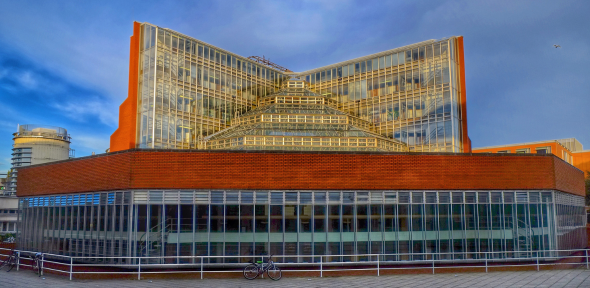
Background
The Faculty of History sits within the School of the Humanities and Social Sciences (SHSS) and is housed on the Sidgwick Site in the Stirling Building, which is considered one of the best examples of modern post-war architecture in the UK.
Completed in 1968, the Grade II* listed building was designed by the pre-eminent British architect James Stirling - the annual RIBA Stirling Prize for Architecture is named in his honour. It is one of three Red Trilogy buildings along with the Engineering Building at the University of Leicester and the Florey Building at Queen’s College, Oxford.
It is also home to the Seeley Library, one of the seven libraries serving SHSS, managed centrally as part of Cambridge University Libraries (CUL). The Seeley Library offers 340 study spaces and a collection of c120,000 physical items across five subject areas (History, Sociology, Land Economy, Latin American Studies, and Politics and International Studies). The library offers a wide range of training and support to students and staff of all disciplines, and welcomes over 1,100 visitors per day at peak times of year. It is a popular study space across subjects, welcoming students from throughout the Sidgwick Site, as well as local Colleges.
While the building is an architectural icon and inseparable from the identity of the History Faculty, the building now requires significant renovation in order to provide an environment where our staff and students can thrive.
The project – an inclusive, flexible space for a thriving collaborative community
Aligned with the University’s wider ‘Reshaping our Estate’ programme, the School of the Humanities and Social Sciences and Cambridge University Libraries are embarking on a project to repair and enhance this seminal 20th Century building.
Our goal is to create a flexible space at the centre of the Sidgwick Site, to respond to the University’s ever-changing requirements. The project will create a sustainable academic community that breathes life into the building for the next 100 years.
As part of wider University plans for the development of the Sidgwick Site, our goal is for this project to deliver a space that supports the wider arts, humanities and social sciences community at the University by:
- Transforming the environmental performance of the Stirling Building through the use of innovative technology and materials that significantly reduce energy use and solar gain, to create a building that is inclusive, accessible, enjoyable and comfortable to use.
- Following a conservation-led approach which seeks to repair and restore the distinctive style and features of the building; to reinstate and reuse materials, such as the original glazing, in the building restoration; and where necessary to recontextualise and breathe new life into the Grade II* listed building.
- Reimagining Stirling’s vision for a building wrapped around books with the act of reading – and intellectual interaction – at its heart.
Tim Harper, Head of the School of Humanities and Social Sciences, said, “The project is true to James Stirling’s vision in that it looks to the future. It will enable all those who use the building to work together in new and exciting ways.”
What’s next?
The project is still in the early stages of the development process – with construction due to start from 2025, subject to planning and listed building approvals from Cambridge City Council. If the refurbishment is approved, the building will need to be vacated and alternative temporary space for the Faculty and Seeley Library will be established while the works are in progress.
Access to the Seeley Library collection
The Seeley Library will move into a dedicated space within the University Library (UL) from December 2024, until work on the Stirling Building is completed. The move will take place after Michaelmas term ends and the Seeley Library will operate as normal for the entirety of the term.
From January 2025, the Seeley Library will operate from the West Room in the UL on West Road, a 5-minute walk from the Seeley’s current location. Users will continue to have access to the full Seeley Library collection in its new, temporary home. Find out more about the plans.
Decant of the History Faculty
Decant of the History Faculty is likely to take place in Easter of 2025. Updates on the arrangements and timescales will be provided as soon as possible.
Find out more
If you have any questions about the project, or would like to learn about opportunities to support the project as it progresses, please contact Stirling.Project@admin.cam.ac.uk
University of Cambridge staff and students were invited to view an exhibition about the plans. You can find materials from the exhibition on the Estates Division website (Cambridge University users only).
